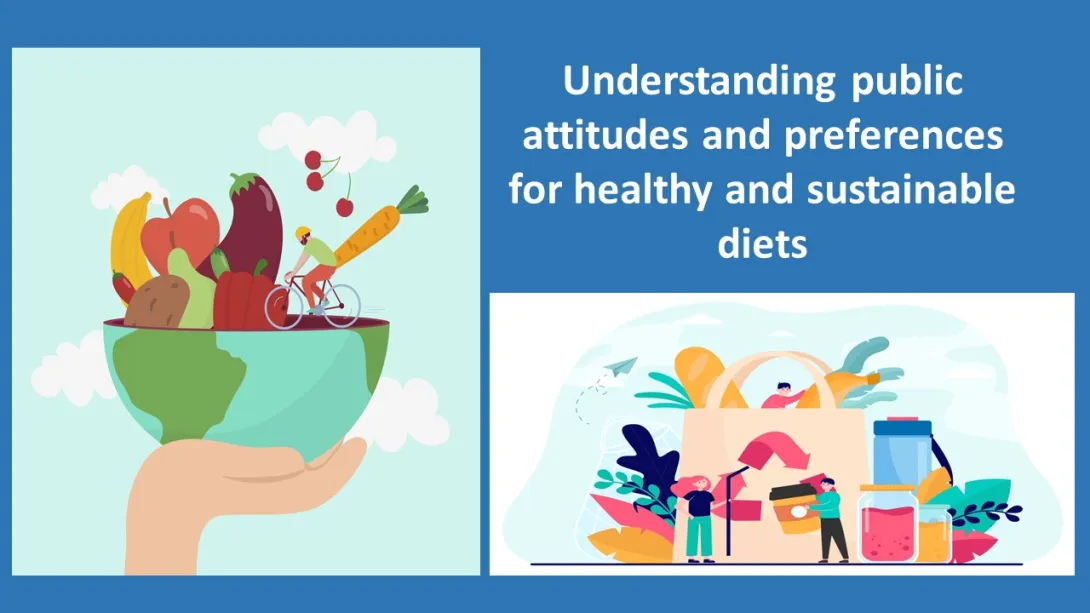Understanding public attitudes and preferences for healthy and sustainable diets
Project Lead

Challenges
The Food, Agriculture, Biodiversity, Land-Use, and Energy (FABLE) Consortium, a global network of researchers, published a report in 2020 titled “Pathways to Sustainable Land-Use and Food Systems in the United Kingdom by 2050.” This report outlined how sustainable food and land-use systems can contribute to raising climate ambition, aligning climate mitigation and biodiversity protection policies in the UK. The report recommends that existing and emerging national policies within each of the four UK nations should consider the strong evidence that a healthy diet could play in reducing greenhouse gas emissions and protecting biodiversity. The report also highlights that modelling consumer behaviour is likely to become even more important.
Within Scotland, the “Food Standards Scotland Strategy for 2021-2026: Healthy, Safe, Sustainable: Driving Scotland’s Food Future” incorporates these recommendations in its values and guiding principles. The FSS strategy highlights the role of “social research in understanding what influences human attitudes and behaviour so that policies are capable of driving positive change”.
There are several Goals defined for 2021-2026. One of them consists of delivering a food environment which empowers consumers to make safe, healthy, and sustainable choices. This can be achieved by driving and influencing strategies for improving access to healthy and sustainable diets for the people of Scotland. Another goal is to engage with all parts of society in Scotland, to understand the issues that matter to consumers and provide information that is tailored to their needs. To achieve these goals, we need the best available data and methods to strengthen insights into behaviours, attitudes, and wider food interests of the Scottish population. We also need to integrate evidence from research on public health and demographics to ensure advice on dietary health improvement is targeted to the appropriate population groups for maximum benefit.
Questions
Solutions
This project is using social research methods to understand public attitudes and preferences for healthy and sustainable diets, considering the socioeconomic characteristics of consumers, to better inform future policies that aim at dietary behaviour positive changes.
Identifying international examples of successful approaches to driving long-term changes in dietary behaviour
To do this, we are identifying successful approaches to driving long-term changes in dietary behaviour across the international stage. We are reviewing the existing evidence, around the world, on behaviour change interventions that work not only in the short-term but are also successful in maintaining long-term changes in dietary behaviour. We are investigating socioeconomic facilitators and barriers to behaviour change and are focusing extensively on the issue of sustainability in healthy diets.
Profiling consumer attitudes towards healthy and sustainable diets
We are understanding how consumers define a healthy and sustainable diet and developing an attitudinal scale regarding healthy and sustainable diets. This is producing rich descriptions of the different points of view that exist about healthy and sustainable diets by sampling the range and diversity of views expressed.
We are also identifying issues where there is consensus, as well as those that distinguish points of view. This is leading to a better understanding of consumers’ perceptions of what a healthy and sustainable diet is, which might differ from policymakers’ definitions. The attitudinal scale is providing a measure of people’s underlying general attitudes, such as beliefs and perceptions in the major dimensions of the perceived value of healthy and sustainable diets. By identifying groups or “types” of persons who share similar attitudes, as well as providing a measure of their attitudes, we are providing relevant evidence to inform more targeted policies aimed at dietary changes.
Identifying the drivers of healthy and sustainable diets of most value to consumers
We are identifying the drivers of healthy and sustainable diets that are of most value to consumers and assessing how those drivers vary across different groups in terms of their socioeconomic characteristics as well as their attitudes on healthy and sustainable diets. This is allowing us to identify the attributes of healthy and sustainable diets which are key for the general population. We are informing policy on how to develop strategies to change consumers’ behaviour regarding healthy and sustainable diets that are personalised to different socio-economic and attitudinal groups.
Project Partners
Progress
2023 / 2024
Phase 2 of the project started in April 2023, with the goal of understanding what people think about healthy and sustainable diets. This phase focuses on how people see and define these diets, using a research method called Q-methodology which uses both qualitative – which focuses on collecting detailed, descriptive information, often through interviews, conversations, and observations - and quantitative - a way of studying things using numbers and statistics to understand patterns and trends- methods of research. The project aims to learn more about how consumers understand and interpret healthy and sustainable eating, which may be different from the views of policymakers.
Throughout the year, the team got ethical approval to start gathering data. This included reviewing academic studies, looking at social media discussions, and interviewing 14 members of the public. From this data, they identified various opinions - around 500 statements - which they called the "concourse" in Q-methodology. The team then narrowed down these opinions to create a smaller, balanced set of statements, known as the "Q set," to be tested in a pilot study.
In September, the project held a meeting with an Advisory Group, which included members from organizations like Food Standards Scotland and Public Health Scotland to get feedback from key policy partners.
2022 / 2023
The overall aim this project is to use social research methods to understand public attitudes and preferences for healthy and sustainable diets, with a particular focus on socioeconomic factors impacting consumers behaviours.
The specific aim of Phase 1 of the project was to identify socioeconomic facilitators and barriers to behaviour change associated with the adoption of healthy and sustainable diets, at a population level, across the international stage. A literature review was conducted, which identified existent evidence on the socioeconomic facilitators and barriers to healthy and sustainable diets. In terms of relevant research findings, we found that, although there is a vast field of literature looking at socioeconomic determinants of healthy diets, the overwhelming majority ignores issues of sustainability, with most of the studies identified for Phase 1 having been published very recently, in the past 5 years.
Just over half of the studies identified looked at the price of healthy and sustainable diets as a major barrier to the adoption of these diets, a quarter looked at socioeconomic indices and others looked specifically at household income and education.
The main findings are that:
• Overall, Healthy and Sustainable (H&S) diets are not necessarily more expensive than current diets, so food prices are not a barrier to accessing a healthy and sustainable diet.
• When considering household income or socio-economic status, the lowest income households would struggle to afford H&S diets, with many just above the acceptable range of food affordability or not able to afford it.
Previous Projects
Related Projects
Food Culture and Dietary Choice
This research targets a number of complementary, interdisciplinary strategies to support changes in food culture, social norms and dietary choices towards ‘sustainable and healthy balanced diets’. Socioeconomic and behavioural approaches will be applied to characterise factors affecting dietary choice and behaviours in different population groups and life-stages, particularly cultural influences. The aim is to explore the potential benefit of innovative interventions to change dietary habits.
